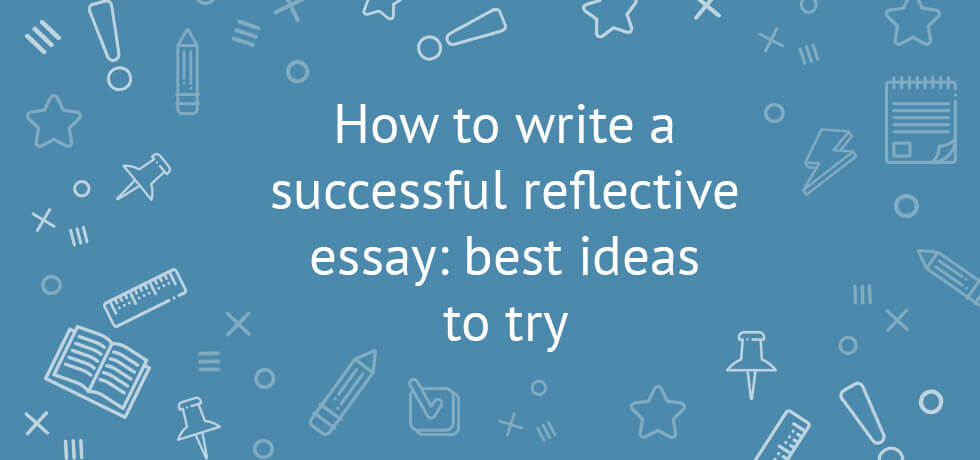How to write a successful reflective essay: best ideas to try

A reflective essay is a very personal writing. An author can create such a paper after analyzing an aspect from the outside world, after acquiring new information that needs to be shared in a subjective way. Often times, a reflective essay is a portrait of the author himself, describing his own beliefs through writing.
To really get to craft such a paper, you have to explore changing in all its levels. In other words, there has to be a certain intimacy between you and the audience. A reflective essay has multiple facets, for beyond the rules, there are the personal stories that matter. Each piece of work is unique, shaped by a different experience.
Despite being so personal, there are some rules of drafting a reflective essay. Not every confession fits into this type of writing, so here is some guidance to help you out.
Do some research
To find the inspiration you need, maybe you could do some research before starting to write. Read the "personal comment" column from any newspaper you find or browse the Internet for a personal multimedia storytelling, just so you can make an idea about what it really means. You may find a good topic in every moment that left its mark on who you are today. It can be a fear you overcame, a life-changing event, an unforgettable episode or a time your convictions gained a new meaning.
Many professors ask for a personal reflective essay without explaining what it implies, so students often find themselves puzzled by the task. But writing a reflective essay is actually enjoyable once you got wind of the technique.
Take your time to look back
The power to reflect is the foundation of a genuine reflective essay. Being able to look back into the past and accurately describe how a specific event impacted you, is an elementary factor. So there is no room for rushing and writing in a hurry. Just have a good cup of coffee, enjoy the silence and reassemble the pieces of the scene you're trying to write about. How did you feel before, how did your perspective change afterward? Sometimes the memories are bustling out, but sometimes they seem to be locked up in your deepest thoughts like a dearest treasure. That is why you need time to hindsight.
Be honest when describing your feelings
Imagine that you are trying to describe an episode of racism that you have witnessed and how you felt about someone being discriminated. Note down any detail you recall and then try to build the scene from a personal perspective. Did you stand up for the victim or, on the contrary, you just walked by, ignoring the action? Being honest is key. Hold off the instinct of writing how things should have happened, but describe how they exactly occurred. However, remember that you are not re-telling the story, but you are putting down your own memories, filtered through your personal thoughts.
Write as you recall facts
Pen everything you remember as you remember. Raw, with no revision. You might forget parts of the story which can prove to be essential. Any flashback can be useful, so even if you're waiting for the bus on your way home, take a pen and write down your new idea. It might turn out to be valuable when you put everything together. It might even be the leitmotif of your essay. Some professors ask for a specific structure of an essay, and they even state their personal predilection towards a specific recurrent idea. This somehow discourages creativity, but if you don't have such holdbacks, feel free to explore your memories.
Create an engaging introduction
Some experts suggest that writing the introduction last works better, especially when drafting a reflective essay. That is because many ideas can change in the process and you will need to adjust the introduction accordingly so that you won't overlook essential information.
However, regardless of when you decide to create an introduction, make sure it catches the eye. Make it attention grabber either by using an anecdote, a flashback, or a rhetorical question. The introduction is your paper’s first contact with its readers, so make it count, make them want to know more. Here are some useful tips on writing a great introduction for your reflective essay:
Make a great first sentence to keep the audience’s interest;
Pay attention to the length – it doesn’t have to be too long. About three short paragraphs should be enough to embrace the most relevant issues of your paper.
Place a rhetorical question right at the beginning. Your readers will be intrigued by it, and you will give them a good reason to follow you through the rest of the essay.
Write down as many details as you can
Yes, you can afford to use many adjectives and a simple vocabulary to describe any detail you find important. A reflective essay is not a rigid writing. Actually, it is so flexible that it becomes a pleasure to commit to such a task. Be as specific as you can, for the story you are putting down reflects your own view, your personal beliefs. For example, instead of saying that a certain thing made you sad, you can make a gentle suggestion, so that you create a connection with your audience.
For example: "The view made me feel sad" can turn into "the view made me feel like there was no color left to fill my eyes, like all I could see was grey". Look at the reflective essay as if it were a painting. Your personal experience paints unique features, that only your mind can tell.Also, don't forget to engage your reader by using scenes of action - a wide rage of strong verbs stands for a successful personal writing. Always try to be original and avoid using commonplace verbs, such as “cried” or “went”. But remember that you have to be constant when choosing the right tense. And avoid juggling the verb forms at all cost.
Express one idea at a time
The tricky part when writing a reflective essay is how to get organized. Being so personal, you might feel the need to let words pour like a raving rain. This is not necessarily a bad thing, but imagine that your readers should always open the umbrella when reading your writing. So it is preferable to express one idea per sentence. A compelling story is first and foremost, readable.
Look for any errors
Grammatical and spelling errors can compromise a beautiful story, and no matter how well written an essay might be, this is disturbing. Make sure your work is flawless and let your readers enjoy the writing, instead of being annoyed by typos. The easiest way to do it is by properly editing your text. Sure, you might have many other tasks to complete and time is constantly a problem. But if you organize your day wisely, you can make room for proofreading, for sure.
However, when the deadline is so close that you can almost see it right on the corner, it might be time to delegate. We strongly recommend you use a proofreading online service, with spectacular results. It is my all means a time-saving option, but it can bring certain costs, so plan ahead and make sure it is the best alternative for you.
What are the “dont’s”?
When writing a reflective essay, there are some things you should avoid. Always keep in mind that you are working at a personal paper, so throw away the tendency to generalize, and the rigid, academical structure of other kind of essays that you were used to write.
Moreover, try to demonstrate the lesson you have learned from the entire experience. One common mistake students make is avoiding to write down memorable details that have shaped their thinking. On the contrary, reflection demonstrates a personal perspective, which means that you should not draw back from stating your own vision. Incoherency is another shortcoming that appears to be omnipresent in most reflective essays. Although it is hard to keep your thoughts on track once the pen touches the paper, try to maintain a logical sequence of your memories. A good idea is to revise the raw version of your paper. This way you won’t hold back the thoughts once they come and you won’t miss important details. Either way, keep in mind that regardless of the topic, a reflective essay must reflect your particular style, your personal vision. It is the only way you can achieve a great reflective writing.
Still struggling with an essay?
Sure, you do not always have the time or the skill to write a great reflective essay. That is exactly where our team can prove useful. Elite Essay Writer will gladly take any academic paper off your hands, and for a low price on top of that!





